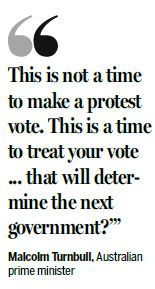Election seen as dead heat, minor parties are likely power brokers
Australia braced for an election that was too close to call on Friday, with Prime Minister Malcolm Turnbull warning of economic chaos if his gamble on an early poll backfires and leaves him without the outright majority he needs to enact major reforms.
The leader of Australia's conservative coalition prompted Saturday's election by dissolving both houses of parliament in May, blaming intransigent independents in the upper house Senate for blocking his agenda.
New polls on Friday showed voters may return an even more unruly upper house.
Turnbull argued on Friday that minor parties, possibly in coalition with center-left Labor, could not be trusted to manage an economy hampered by the first mining downturn in a century and balance public finances after years of deficits.
Turnbull, acknowledging that the contest was "really close", urged voters not to be cavalier.
"This is not a time to make a protest vote. This is a time to treat your vote as if that is the single vote that will determine the next government," he said.
Turnbull's coalition is facing a strong challenge from Labor, as well as from independents and minor parties like the Greens, who could win enough seats to hold the balance of power in the Senate or force a minority government in the lower house.
A Fairfax/Ipsos poll published on Friday showed Labor and the coalition locked in a dead heat.
Turnbull's own grip on power even appeared tenuous, with the poll showing 27 percent of voters intended to vote for a party other than the coalition or Labor.
Independent Senator Nick Xenophon, whose new party is fielding almost 50 candidates, could also emerge with influence. So, too, could far right parties, including Pauline Hanson's One Nation, who have campaigned on anti-immigration, anti-Muslim agendas.
"Whatever happens in this election ... if we see One Nation elected, if we see a greater informal vote, blame Malcolm Turnbull and the Greens. This was their idea," Labor leader Bill Shorten said.
Turnbull's repeated attacks on minor parties could have inadvertently driven voters into their arms by elevating their status on the national stage, said Professor Andrew Hughes from the Australian National University.

(China Daily 07/02/2016 page8)














